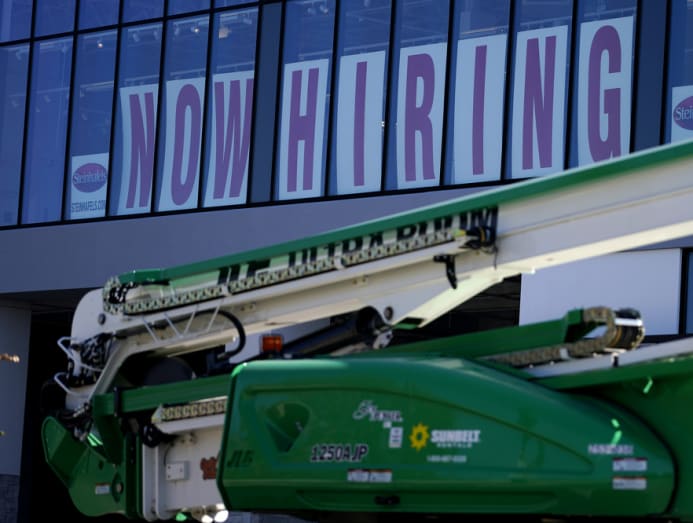Commentary: Workers don't want to be managed, they want to be partners
TORONTO: Information technology's time for business, political and organisational leaders to surrender on "management".
Workers today don't want to be managed, even benevolently. They want to be partners in co-cosmos, where all members are empowered to bring their whole selves to the organization regardless of hierarchies.
Consequently, those uncomfortably perched atop organisational hierarchies are faced with a stark selection: Co-create or manage, because you cannot do both.
As businesses beginning to envision a post-pandemic world, they are faced with unprecedented challenges, like the and then-called Peachy Resignation that involves millions of employees opting to quit their unfulfilling jobs, and political pressures to "build dorsum amend."
Every bit I debate in my recent book, Connected Commercialism, we demand to motion away from an accent on "management" and towards a focus on co-creation.
Management is passé. Co-cosmos will allow u.s. to thrive in coming together the changing demands of fundamental stakeholders like employees, customers and governments.
EMPLOYEE Angst
Even before the pandemic, in that location was a crisis of worker dissatisfaction, with millennials - the generation poised to brand up the majority of our workforce - viewing business organization as out of pace with their priorities.
Corporations must commit to a broader social purpose or face disconnected and unmotivated workers unlikely to stay in their jobs. Co-creation builds on that rare and valuable sense of connection emerging in the very best type of purpose-driven branch partnerships.
The feeling of connection is so of import, we volition kickoff to normalise viewing friendship as an essential work resource, since nosotros now know that co-performance is not built-in of deep analytical calculations, but intuition and feelings.
Often, when management gurus talk about co-operation, what they really mean is managing subordinates into passivity.
Co-operation in this context is contingent on repression. That's non co-cosmos.
PANICKED RESPONSES
When I speak to executives, I often go a panicked reaction: "What does this mean for my ability to run the business concern?"
Assuredly, controlling power stays in the C-suites. But an empowered team simply increases the effectiveness of leadership.
And while corporate behemoths like Google are leading with this new course of activity, a 20-year study of more than 300 companies plant homo-centric approaches that empowered employees improved performance in a wide diverseness of settings.
And co-creation is not only about loosening the managerial reins on employees. Many businesses take come to realise that they don't get the all-time product by closely managing their suppliers with laundry lists of desired specifications.

Instead, optimal outcomes are often attained past supporting suppliers in co-creation, giving up control and letting them lead the way.
This practise in trust and vulnerability showcases the deepest level of relationship - when ii organisations surprise ane some other by agreement each other so deeply that i delivers what the other wants only did not inquire for.
Does the ultimate determination-making power yet sit with the paying client? Of course. Clients can demand their supplier's development squad stick to product roadmaps and manage the process so requested features get built.
Are there meaning efficiency and reputational risks involved when managers take the liberties afforded by co-creation?
Absolutely. But the better question to ask is this - does a path to innovation exist that isn't total of take chances and inefficiencies? I don't know of one.
GENERATIONAL SHIFT
Consider electric current indicators that workers are quitting rather than giving upwardly the ability to work from home.
Michael Solomon, co-founder of 10x Direction, explained to me that this is an expected feature of the "talent economic system." Everybody, up and down the hierarchy, is both empowered and willing to take responsibility for what they exercise.
Whether the outcomes are good or bad, those who take risks own the consequences.
Are there risks in letting workers set the terms of how they work? Yes. And to some executives, workers making such demands appear to have an unjustifiable sense of entitlement.
But feeling similar you are being managed is antithetical to productive work. Solomon explains this every bit a generational shift, and warns that the former style of management is being phased out adequately apace.
Co-creation doesn't hateful nosotros no longer need CEOs. Merely it may be more helpful to view leading exclusively as a verb and not a noun.
Business concern researchers are finally emphasising the relational and dynamic aspects of ability, how a leader's relationships with stakeholders can be a source of support or resistance and how they must continually adapt to changes in social systems.
The shift away from the stifling, controlling and outdated dominance of direction in favour of co-cosmos is an accented must for those helming organisations - from private sector businesses to governments and healthcare organisations - even if the prospect makes some existing leaders uncomfortable.
David Weitzner is an assistant professor in Authoritative Studies at York University, Canada. This commentary outset appeared on The Conversation.
Is 2022 the year when employees accept back control over work amid predictions of a great resignation moving ridge, non to mention complaints of bad bosses, long working hours and unfair demands?
Source: https://cnalifestyle.channelnewsasia.com/commentary/leadership-workplace-management-partners-cocreate-employers-employees-299611
0 Response to "Commentary: Workers don't want to be managed, they want to be partners"
Post a Comment